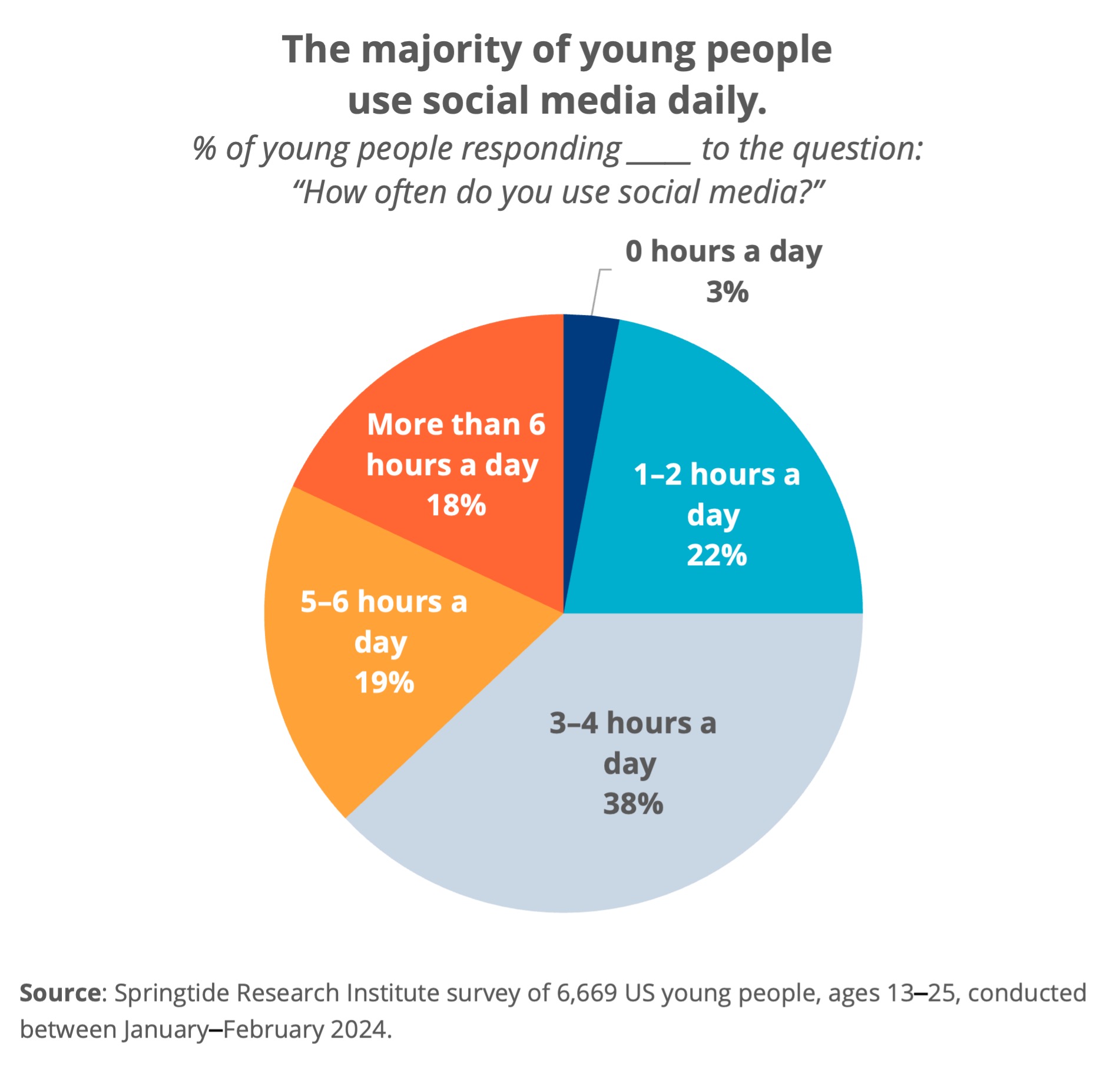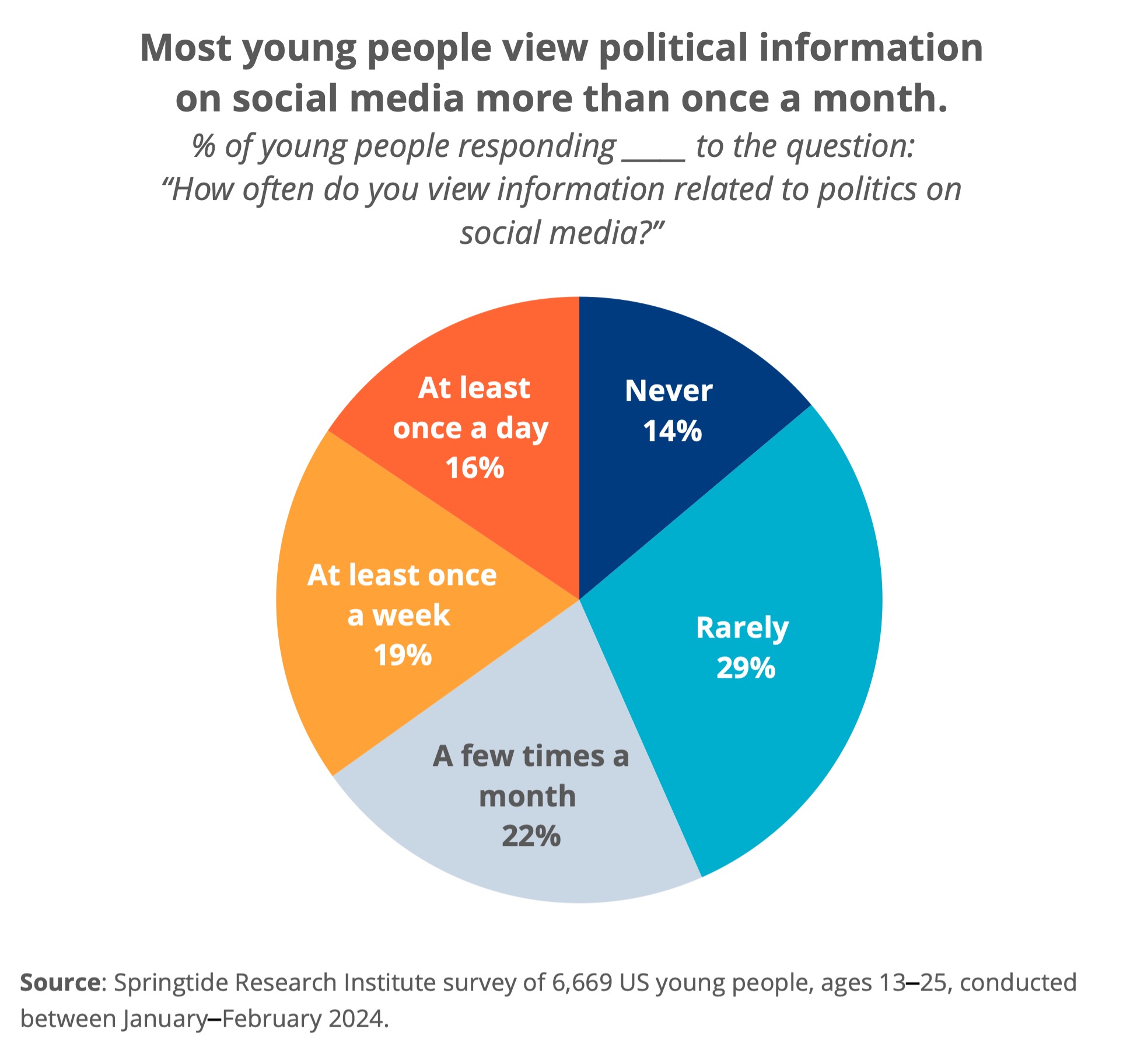
When It Comes to Political Issues, Young People Both Value and Distrust Social Media
This election year, Springtide Research Institute surveyed over 6,500 young people, ages 13 to 25, asking them about their social media use and civic engagement. About a quarter of young people say that social media influences their opinions about political issues.
More Than One-Third of Young People (37%) Report Using Social Media over 4 Hours a Day
Nearly all young people (97%) report using social media daily, with almost 4 in 10 using social media 5 or more hours a day.

How Often do Young People View Information Related to Politics on Social Media?
More than a third (35%) of young people say they view information related to politics on social media on a weekly or daily basis. About a quarter (26%) say that social media influences their opinions about political issues.

To better understand how time spent on social media shapes young people’s views on political issues and events between, December 2023 and March 2024, Springtide interviewed 76 young people, ages 13 to 25, from across the country. Three key themes emerged, highlighting that when it comes to political issues, young people both value and distrust social media.
-
Young people see social media as a place where they can learn about political issues and events they are not learning about elsewhere.
The biggest thing that’s going on right now is Gaza. That’s been very heavy on social media, and that’s probably, like, the strongest source of information just because there’s so much information coming from that. And then I don’t see it as much in the news.
—Stacey, 21, liberal
[Social media] has shown me things that I wouldn't normally be able to get access to without social media. Like Palestine and Israel, would I have known about that if it wasn’t for media sources?
—David, 17, moderate
The US is sending, like, billions of dollars to Israel to support the war and stuff like that. Which is something I, I don’t think I would have seen or I don’t think they would openly talk about . . . But I feel like on social media you definitely get, like, different views and different insights on things.
—Amari, 19, liberal
-
According to young people, the specific advantage and influence of social media is learning about issues firsthand.
They value getting “insider” information from people who share what they experience directly, especially when those posts show live events.
I have a Ukrainian friend, and she likes to post a lot about that. And I do read [her posts] because I do feel that you need to be informed about what’s happening.
—Monica, 19, liberal
[Social media] has kind of given me a different perspective or like, given me a little insider view because I think people on, like, Twitter talk about how there’s a recession and people don’t have money. And I think recently there was the issue of people getting, like, a small amount of tax returns back.
—Amari, 19, liberal
I feel like it was the [posts of] videos of, like, people being bombed and, like, videos of the people in the hospital being, like, all bloody and dismembered and stuff that [really impacted me]. I was like, 'That’s harsh. No one should be—no child or anybody should be—held like that.'
—Daisy, 19, conservative
[Social media] definitely has affected me more than word of mouth. I think I definitely am a more visual person. And, like, seeing something has more of an impact to me than just hearing about it or hearing someone’s opinion about it.
—Ileana, 21, moderate
-
Young people do not fully trust what they learn on social media.
This distrust stems from a lack of clarity on whether people posting are educated on the topics they post about and which topics seem to get the most attention.
I don’t think it’s fair for people to post all these things on their Instagram stories and making all of these claims when they’re not actually educated on the topic, and they don’t understand what’s actually going on. Like, for example, I find myself sometimes challenging someone’s opinion which is totally wrong, and they just don’t have anything to follow up with, so clearly they’re not educated on the matter, and they’re just making these bold claims without having any evidence to support what they’re saying.
—Lisa, 21, conservative
As much as I love social media and TikTok and all that stuff, I don’t think that that’s often the best—unless you have really good social media literacy. I just can’t see that being the best place to, like, gather and consume information.
—Ava, 22, liberal
I can definitely understand what’s happening because people are, like, sharing their testimonies, and I’ve never seen that before happen . . . but it’s curious to think, like, why some things get such coverage and other things don’t.
—Michelle, 24, conservative
I think social media also has a lot of influence. But I don’t really like to believe everything that I see on social media. So if I see something I’ll be like, ‘Oh, let me research that before I, like, talk about it.’ ’Cause I don’t wanna be like, ‘Oh, I saw this and this and that.’ And people would be like, ‘Oh, what are you talking about? That’s not right.’
—Kailyn, 18, liberal
See our latest work on how young people are navigating civic life. Order Cultivating Care and receive our newest insights on how and why young people create and sustain patterns of care in their civic lives, and how adults can support them.
Note: All names are pseudonyms. See question wording and survey responses in the topline survey results and review methodology here.



